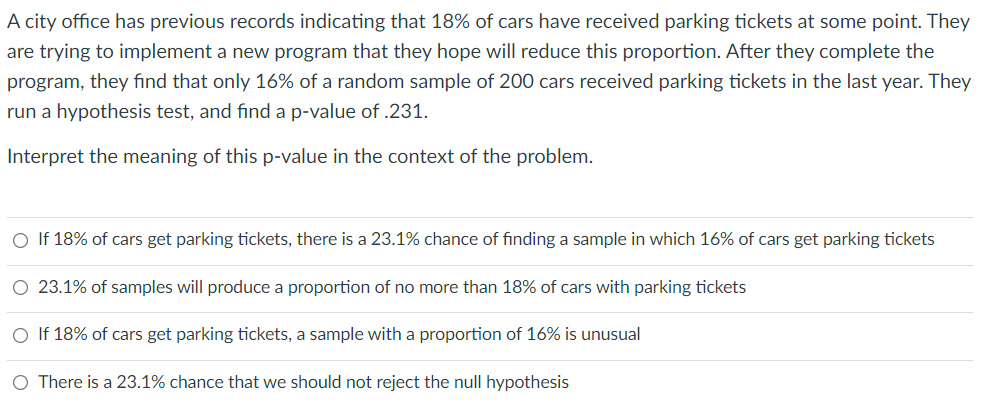A city office has previous records indicating that 18% of cars have received parking tickets at some point. They are trying to implement a new program that they hope will reduce this proportion. After they complete the program, they find that only 16% of a random sample of 200 cars received parking tickets in the last year. They run a hypothesis test, and find a p-value of .231. Interpret the meaning of this p-value in the context of the problem.
A city office has previous records indicating that 18% of cars have received parking tickets at some point. They are trying to implement a new program that they hope will reduce this proportion. After they complete the program, they find that only 16% of a random sample of 200 cars received parking tickets in the last year. They run a hypothesis test, and find a p-value of .231. Interpret the meaning of this p-value in the context of the problem.
College Algebra (MindTap Course List)
12th Edition
ISBN:9781305652231
Author:R. David Gustafson, Jeff Hughes
Publisher:R. David Gustafson, Jeff Hughes
Chapter8: Sequences, Series, And Probability
Section8.7: Probability
Problem 58E: What is meant by the sample space of an experiment?
Related questions
Question

Transcribed Image Text:A city office has previous records indicating that 18% of cars have received parking tickets at some point. They
are trying to implement a new program that they hope will reduce this proportion. After they complete the
program, they find that only 16% of a random sample of 200 cars received parking tickets in the last year. They
run a hypothesis test, and find a p-value of .231.
Interpret the meaning of this p-value in the context of the problem.
O If 18% of cars get parking tickets, there is a 23.1% chance of finding a sample in which 16% of cars get parking tickets
O 23.1% of samples will produce a proportion of no more than 18% of cars with parking tickets
O If 18% of cars get parking tickets, a sample with a proportion of 16% is unusual
O There is a 23.1% chance that we should not reject the null hypothesis
Expert Solution
This question has been solved!
Explore an expertly crafted, step-by-step solution for a thorough understanding of key concepts.
This is a popular solution!
Trending now
This is a popular solution!
Step by step
Solved in 2 steps

Recommended textbooks for you

College Algebra (MindTap Course List)
Algebra
ISBN:
9781305652231
Author:
R. David Gustafson, Jeff Hughes
Publisher:
Cengage Learning

College Algebra (MindTap Course List)
Algebra
ISBN:
9781305652231
Author:
R. David Gustafson, Jeff Hughes
Publisher:
Cengage Learning